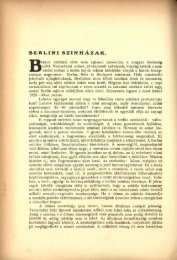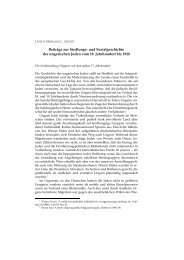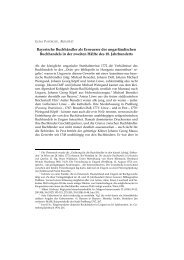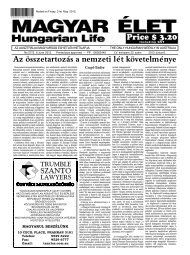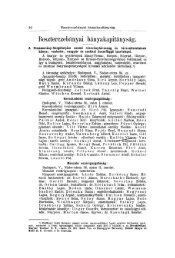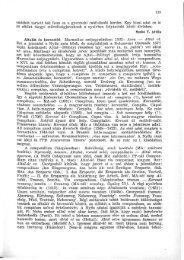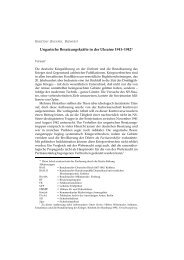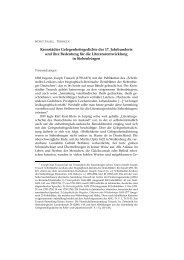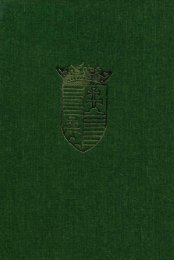hungarian studies - EPA - Országos Széchényi Könyvtár
hungarian studies - EPA - Országos Széchényi Könyvtár
hungarian studies - EPA - Országos Széchényi Könyvtár
Create successful ePaper yourself
Turn your PDF publications into a flip-book with our unique Google optimized e-Paper software.
SOME QUESTIONS ON HUNGARIAN-SOVIET RELATIONS 31<br />
three weeks ago?" Other specific issues, such as the kolkhoz movement, had not<br />
been touched on, but this visit in Moscow proved to be the first step in the Soviet<br />
retreat from fostering serious reform in Hungary. 154 This backtracking would eventually<br />
lead to the Hungarian Revolution of 1956.<br />
Following the old dictator's death rapid changes were introduced in Soviet<br />
foreign policy. Malenkov announced a "peace initiative" at Stalin's funeral and<br />
proclaimed that all outstanding issues between the USSR and the United States<br />
could be solved by peaceful means. On March 18 the triumvirate of Molotov,<br />
Malenkov and Beria outlined a peace proposal for Korea. Moscow restored relations<br />
with Israel, Yugoslavia and Greece and dropped territorial claims against<br />
Turkey. 155 Beria would have ventured even further had the temporary coalition of<br />
Molotov and Khrushchev not blocked him. Beria also prepared an initiative toward<br />
Yugoslavia for a "fundamental reappraisal and improvement of the relations<br />
between the [two] countries". 156 In order to forestall West Germany's co-option<br />
into the Western defense system, he proposed the unification of Germany on a<br />
non-socialist basis. 157 Powerful as he may have been, Beria would soon be brought<br />
down by Khrushchev, whose abilities he had underestimated. Georgi Malenkov, a<br />
technocrat, seized the post of Prime Minister and lingered on a little longer. Unlike<br />
Beria, however, Malenkov survived his fall and was allowed to live quietly in<br />
retirement. On August 8, 1953 in a nationally broadcast address Malenkov distanced<br />
himself from the dogma of the inevitability of war with the capitalist world<br />
and declared that "there is no objective grounds for a collision between the United<br />
States and the Soviet Union". 158 Later, he would assert that a reduction of tensions<br />
was the only alternative to the Cold War, that is, to "the policy of preparing for a<br />
new world war". Such a war, he declared, would destroy "world civilization". 159<br />
This declaration was far from the ideas espoused by Khrushchev, who was still<br />
thinking in terms of the destruction of the capitalist bourgeoisie. He forced<br />
Malenkov to repudiate publicly his heresy, and on January 31, 1955 at a plenary<br />
meeting of the Central Committee Malenkov was dismissed from his post of Prime<br />
Minister. 160 This coincided with the dismissal of Imre Nagy in Hungary and the<br />
strengthening of the Stalinist line within the HWP. The two events were perhaps<br />
not coincidental. 161 Nagy, who received his mandate for change from Moscow,<br />
gradually lost the Kremlin's support as Beria was executed and Malenkov's influence<br />
began to ebb. The fate of the Hungarian "new course" was not decided in the<br />
Soviet capital alone. Nagy had never agreed to the slavish adoption of the Soviet<br />
model in Hungary and always thought in terms of a Hungarian model of socialism.<br />
He interpreted the mandate for change that he had received in Moscow in his<br />
own way. Nagy thought that Hungary had "skipped" the transition period to socialism.<br />
From this it followed that Nagy initially did not wish to change the model,<br />
but only to slow down the "development". I62 Nagy never wielded as much power<br />
as Malenkov had as the head of the Soviet nuclear weapons program. In fact,


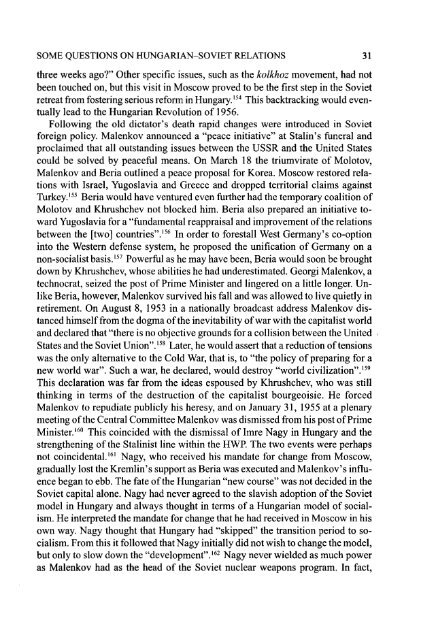
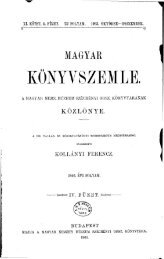
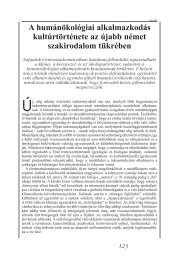
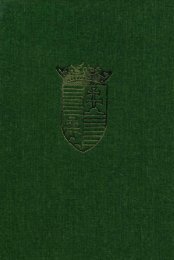
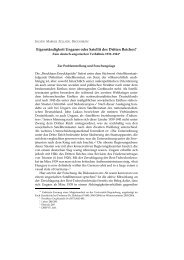
![Letöltés egy fájlban [36.8 MB - PDF] - EPA](https://img.yumpu.com/23369116/1/172x260/letoltes-egy-fajlban-368-mb-pdf-epa.jpg?quality=85)
